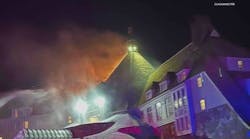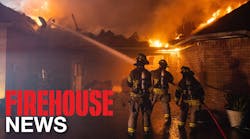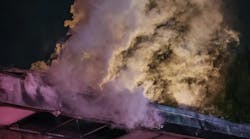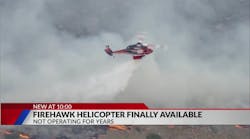WASHINGTON (AP) -- Smallpox vaccinations are beginning anew, three decades after the program was halted, as President Bush said the threat of a bioterror attack with the virus is real though not imminent.
Bush said Friday he will take the vaccine along with U.S. military forces, and he said the vaccine will be offered to the general public within months. He said, however, he is not recommending it for most Americans, and his family and staff will not be inoculated.
Vaccinations for a few dozen military personnel began Friday, and by late January states are expected to begin inoculating medical teams and others who would respond to a smallpox attack.
The government will make the vaccine available to the general public on a voluntary basis beginning in late spring or early summer of 2003, more quickly than health advisers preferred.
With war in Iraq a growing possibility, Bush said the vaccine will be mandatory for about a half-million U.S. troops in ``high-risk parts of the world.'' He noted that the disease was eradicated in 1980.
``In the aftermath of September the 11th, we are evaluating old threats in a new light,'' he said.
The shot carries rare but serious side effects. One or two out of every 1 million vaccinated will be killed by the vaccine, and 15 will face life-threatening complications.
It was unclear how troops would respond to this directive. Some in the military balked at mandatory anthrax vaccinations, which are considerably safer than smallpox vaccinations.
About 20,000 people working in U.S. embassies in the Middle East will also be offered the vaccine, the State Department said.
Civilian vaccinations will begin with about 450,000 people most likely to encounter a highly contagious smallpox patient. That includes people who work in hospital emergency rooms and those on special smallpox response teams. States have already identified these people and are preparing to set up clinics. Once these programs begin, it's expected to take about 30 days to vaccinate this group.
Next in line will be emergency responders, such as police officers, firefighters and other health care workers. The government is recommending the vaccine for an estimated 10 million in this group, and health officials predicted Friday that about half would say yes. It was unclear when these shots would begin or how long it would take to vaccinate this group.
Bush resolved a heated debate within the administration about how quickly to offer the vaccine to the general public -- a point still being debated late this week.
Top health advisers preferred to wait until the vaccine is licensed by the Food and Drug Administration before offering it to people who face no particular threat. That's not likely until early 2004. But Vice President Dick Cheney and others argued for a more aggressive program.
Although his rhetoric emphasized that the vaccine was not recommended for the public at large, Bush sided with Cheney.
``Some individuals feel so strongly they want to be vaccinated right now that we wanted to make it available,'' said Tommy Thompson, secretary of the Health and Human Services Department.
Still, some states are balking at the prospect of delivering vaccinations to so many people so quickly.
Adults who want the vaccine can sign up for clinical trials now under way. HHS also will create a special program for people who want to sign up _ expected in late spring or early summer, health officials said. Or, people could wait until 2004, after the vaccine is licensed, although it will still not be recommended.
Bush and his top health aides emphasized there is enough vaccine for all 280 million people in this country, and that plans are in place for mass vaccinations should an attack with the virus occur.
Once among the most feared diseases on Earth, smallpox killed hundreds of millions of people in past centuries, but it hasn't been seen in this country since 1949. Its eradication was one of public health's greatest victories.
But because no one has been vaccinated in decades, the population is highly vulnerable. While all stocks of the virus beyond two official labs were supposed to be destroyed, experts fear that hostile nations or terrorist groups may have smallpox and could use it in an attack.
An education campaign will explain the vaccine's risks in detail.
The most serious complications include encephalitis, which can cause paralysis or permanent neurological damage, and progressive vaccinia, where the vaccination site does not heal and the virus spreads, eating away at flesh, bone and gut.
The vaccine poses significant risks for certain people, including cancer patients, organ transplant recipients, people with HIV, pregnant women and people with a history of eczema. People who live with others who have these conditions should not be vaccinated, because the live virus used in the vaccine can sometimes escape the inoculation site and infect others.
Health workers delivering the shots will have to ask questions that will screen these people out.





